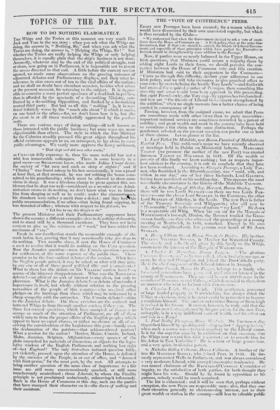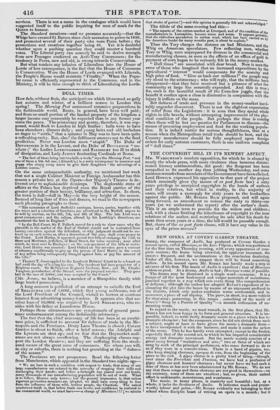THE "VOTE OF CONFIDENCE" PEERS.
EIGHT new Peerages have been created ; for a reason which few would have discovered by their own unassisted sagacity, but which . is thus revealed by the Globe— We understand that when the Government decided to ask a vote of confi- dence from the House of Commons on . ir Irish policy, they at the same time determined, that if that vote should be carried, the friends of Liberal Govern- ment, and especially of those principles which have guided the Executive in Ireland, should be strengthened by seine addition to the Peerage."
Now, if parties were so nearly balanced in the Upper House, on Irish questions, that Ministers could secure a majority there by adding eight Lords to their force, we should perceive the con- nexion between the House of Commons vote and this creation. If Ministers had said to their supporters in the Commons- " Carry us through this difficulty, declare your adherence to our Irish policy, and we will take measures to give practical effect to your votes by overwhelming the hostile Tory Lords"—and forthwith bad creel d the required 'ember of Pesrages, then something like sincerity and sense would have been apparent in this proceeding. But eight Peers !—why, the Tory majority approaches two hundred and how are " the friends of Liberal Government strengthened by the addition," when no single measure has a better chance of being carried in consequence of' it?
Passing, however, from the assigned cause, we admit that Peers are sometimes made with other views than to party necessities : important national services are sometimes rewarded by a patent of nobility; and great wealth and mark in the country have been held to constitute a fair claim to the same distinction. Perhaps the gentlemen selected on the present occasion can prefer one or both of these claims. Let its glance at the list.
1. lord Talbot Do Malabide, now Baron. Funded of Malahide,an English Peer. This nobleman's name we have recently observed at meetings held in Dublin on Ministerial behests. MARGARET TAsmer (we presume the mother of the new Peer) was created Baroness Tasiusr MAssmou in 1831. Of the wealth or poverty of' this family we know nothing ; but as respects impor-
tant services to the country, it is safe to conclude that they have not been rendered. According to Sharpe's Peerage, a Lady TAL- BOT, who flourished in the fifteenth century, was " maid, wife, and widow in one v one of her three husbands, Lord GALTREM,
d having been murered on his v This appears the most
releerkable circumstance in the history of the Malahide TALBOTS. 2. Sir John Stouloy,,f .47,7cri,y, Baronet, Baron Stanley. Thus there will be two Lords ST.■NT.Ey—as there are two Lords Fon- TESerE—one the clever Lord STANLEY, in the Commons, the other Lord STANLEY of :11derley, in the Lords. The new Peer is father of the Treasury Secretary and Whipper-in ; who will now be " Honourable," and in the course of nature " my Lord." Sir JouN is a respectable old Whig. When his son sat for the Marquis of WEF.TM NSTER'S borough, Minion, the Baronet toadied the GROS- VENoa family,--as they who witnessed the proceedings at a county meeting at Northwich, in 1831, remarked. Except in his own immediate neighbourhood, few persons ever beard of Sir JOHN STANLEY.
3. /resell Villiers ,`+'1,4, l?aron Stuart, do .Decir. His brother, ssissi Vi 1.1.1 mats Sri' ler, is Member for 'Waterford County. The st,::1dy and v:Ilti:„:1c aid given by this fluidly to the Whigs, counteracts the inter:st or the ik-Lirquis of WATEaroao.
4. (tutu /s F. Baron Zurgan. " The glorious t's esee ft:0 AN;.,,w," its 11.,, v:as callod, when, twelye-yoars ago, or
more, he des,-,.tod Orangei:m and joined the Pro-Catholic party. lie is the elist' stthsseer of the Liberal interest in Armagh. Art4es rt. h. Doron De Frejno, belongs to a flintily who
for s,,yeral ,::enevations have scd predontneint illt(Tet in the
(101 it of Iloseoniewn. lucy cue s;;id to i u a 40,000 acre. in the counties of 11...iscommon mid Galway. tc Lich desek tided to thcm front an ancestor N\ Ito \Vela In I ucicind V. rlio Nii BOW.
6. Chquflos igh. Dor,n Leigh. has enticman, possessed of large landed property in 'ii arwickshire. has always aided the Vai!,s at elections, thou :di he 1101T IA1111(1. be persuaded to become a emalidate hiaiscir. Thy ancient it al extinct Barony of Stoneleigh re(•ived in his tilvoilr. It cannot, however, be truly said that the L:hcral int:west is streili;iliened by his pro. cut .)11, for the new Peer, todiappily, is in it very indifferent state of health, am/ his.; eldest on and heir is u Tory !
7. Paul Roilku Thompou, tinguished himself by speaking and it. ig against " Appropriat ion;' when such a course was esteemed treachery to the Liberal cause.
IS II for the superior sagacity he exillidted on that occasion, that the NVhigs now rue and him with a coronet ; or to console him for his defeat in East York-Nye lie is a man (4' large possessions, and a very quiet, inoiVensii e person.
8. Nicholas Ridley Colborne, Baron t 'u/borne. A brother of the late Sir MATTnEw lltm.Ev, who joined PEEL in 1S35. lie for- merly represented Wells in Parliament, and was always considered a very moderate Liberal, with strong Conservative tendencies. lie was named chairman of the RAPHAEL-O'CONNELL Committee of inquiry, to the satisfaction of both parties, for both thought they might have his vote. Should be be found in opposition to his patrons, nobody would be much surprised. The list is exhausted : and it will be seen that, perhaps without exception, the new Peers are respectable men; also, that they owe their elevation generally to electioneering interest, not to their great wealth or station in the country—still less to valuable public
services. There is not a name in the catalogue which would have suggested itself to the public inquiring for men of mark for the Queen to honour.
The Standard mentions—and we presume accurately—that the Whigs have created 61 Barons since dicir accession to power in 1830, and promoted several of their party who were Peers before ; the promotions and creations together being 81. Yet it is doubtful whether upon a pushing question they could muster a hundred votes. The Liberal party can scarcely be said to derive strength from new Peerages conferred on Anti-Tory Commoners ; for the tendency in Peers, new and old, is strong towards Conservatism.
But what renders any infusion of Liberalism into the House of Lords of less consequence, is the fact that the House of Commons is Conservative. Were the House of Lords swamped with Liberals, the People's House would maintain "Finality." When the Popu- lar cause is efficiently represented in the Commons, and in the Ministry, it will be time enough to think of Liberalizing the Lords.



























 Previous page
Previous page